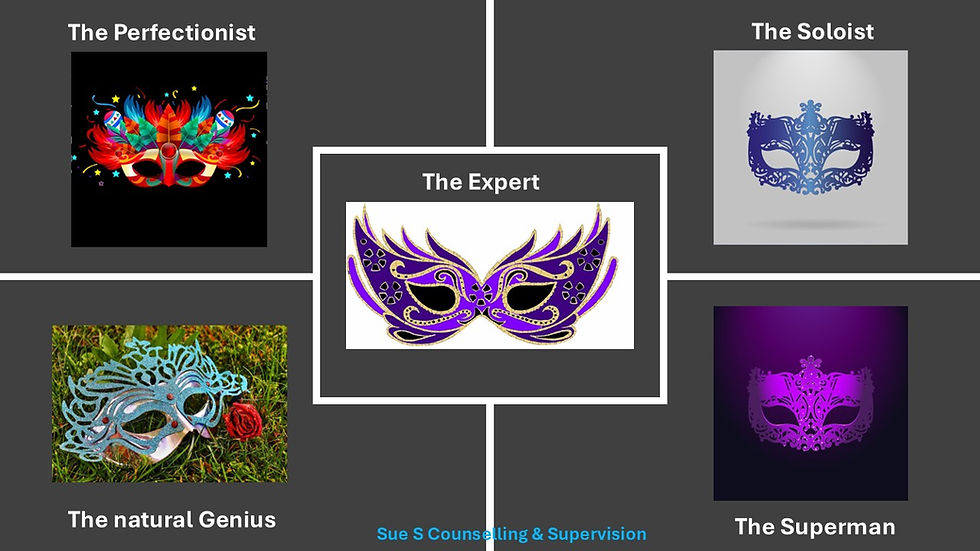IS IMPOSTER SYNDROME RULING YOUR DAY?
- Susan Stubbings

- Jul 19, 2025
- 7 min read
Updated: Jul 20, 2025
Is Imposter Syndrome affecting your daily living?
In my work as a practitioner I often hear, read or talk with clients and supervisee’s suffering with imposter syndrome.
We’ve all experienced it right. I know I have in the past and it can take a long while before we can believe in ourselves without experiencing any self-doubt.

But what is imposter Syndrome?
Whilst it is normal for us all to have occasional bouts of self-doubts or low confidence about what we are doing as a practitioner or question ourself from time to time, these self-doubts are quickly neutralised once we reassure our self, we do know what we are doing and we can self-affirm “I can do this”, “I am capable”, “I’m making a difference” and believe what we are telling ourself.
But what happens when we have a negative internal prattler telling us we are fake, a fraud? This is what we now know as imposter syndrome, this is an internal process where we have feelings of self-doubt that we are not good enough, capable enough and negative beliefs that we often subconsciously exaggerate about our limitations in the roles we are engaged.
These negative thoughts and beliefs can cause us to have anxiety, emotional pain and lower our confidence and self-esteem and if goes on for a long time can lead to depression and low motivations.
On top of the above we also fear we will be exposed for the fraud we think or believe we are in the very next moment. Then everyone will know what a fake I am and shame rears its ugly head as a felt-sense, or on the edge, and we aren’t feeling it fully, since nobody wants to feel shame, right?
But why do we find it so hard to welcome our achievements, accept what we’re good at and what we have taken time and effort about to be successful?
What stops us celebrating and shouting from the roof tops how successful we are, tell everyone we’ve just passed another exam or course of study?
Well….. possibly because we’ve set high standards and hold high expectations for ourselves and these are often so high they are impossible to meet in a realist way, not meeting our personally built standards and expectations evokes shame.
We don’t accept somehow the certificate we hold in our hands as evidence that we are good enough, that’s we’ve achieve something good, progressed and developed ourself.
When we are self-doubting, we often tell ourself that it’s all down to luck, I was in the right place at the right time or we just berate our performance and pull our self-down will negative self-talk. I scraped through, I had support or I was not as good as the others. We mentally filter out the positive, use black and white thinking and any real actual evidence we dismiss. In its wake we find anything which tells us we didn’t achieve this through our own merit and hard effort, commitment and time investment.
Our internal chatterbox tells our inner self, 'I’m not good enough', ‘really I’m a fraud, a fake’, ‘I don’t really know what I’m doing’.
annnnnnnd I’m sure you can add your own put me downs!
In doing so we activate imposter syndromes kissing cousin self-sabotage, then we really can do a negative number on ourselves by procrastinating, creating self-fulfilling prophies, sabotage our relationships or the opposite and do nothing, hoping it will all come out good in the end. But ‘knowing; it won’t because we’re not good enough.
Our beliefs again.
What activates Self-sabotage and imposter syndrome?
Imposter syndrome and self-sabotage are complex psychological phenomenon rather than a mental illness. They are activated consciously or unconsciously and usually functioned as coping mechanisms in childhood.
As an adult these are ignited through:
Internal thought and psychological processors
Competitive environments
Social pressures to do well
Marginalised communities
Feelings - e.g. of not belonging, shame, not good enough
High expectations and self-made standards
Cognitive dissonance
Transitioning into new roles e.g. new job, college, higher level of studies
annnnnnd a whole host of other things or even just wanting to do well and be seen to do well, otherwise others will see how fake we are!
As I type I am reminded of the quote by Marianne Williamson:
“Our Deepest Fear Is Not That We Are Inadequate. Our Deepest Fear Is That We Are Powerful Beyond Measure”
What could we achieve if we focused our attention on what we are good at?
All this self-berating and negative put downs affects our mental health and how we perceive ourself and gives us significant emotional distress as we go around in circles self-doubting, being self-critical and anxious about our performance; eventually this can lead to burnout.

Ironically people who suffer with imposter syndrome are usually accomplished, successful people in a social context and it is the internal cues which are the cause of the syndrome.
Check out your internal cues are they positive or negative?
Which is the loudest?
Even though we are already winners we continue to set goals that are over challenging, unrealistic and feel downhearted and disappointed when we don’t meet them this is the circle of Imposter Syndrome.
Imposter syndrome once activated can influence how we perceive our self-worth, our self-esteem and confidence in our self-efficacy, how we tackle projects and how we interact with others and show up in the world.
The author Dr Valerie Young categorised imposter syndrome into five impostor types which might shed some more light on why we believe we are imposters:
“The Perfectionist’s primary focus is on “how” something is done. This includes how the work is conducted and how it turns out. One minor flaw in an otherwise stellar performance or 99 out of 100 equals failure and thus shame.
The Expert is the knowledge version of the Perfectionist. Here, the primary concern is on “what” and “how much” you know or can do. Because you expect to know everything, even a minor lack of knowledge denotes failure and shame.
The Soloist cares mostly about “who” completes the task. To make it on the achievement list, it has to be you and you alone. Because you think you need to do and figure out everything on your own, needing help is a sign of failure that evokes shame.
The Natural Genius also cares about “how” and “when” accomplishments happen. But for you, competence is measured in terms of ease and speed. The fact that you have to struggle to master a subject or skill or that you’re not able to bang out your masterpiece on the first try equals failure which evokes shame.
The Superhuman measures competence based on “how many” roles they can both juggle and excel in. Falling short in any role — as a manager, team member, parent, partner, friend, volunteer — all evoke shame because they feel they should be able to handle it all — perfectly and easily”.
Source: https://impostorsyndrome.com/articles/5-types-of-impostor-syndrome/

Do you recognise yourself wearing any of these masks? Do any of the above descriptions resonate with you?
If you do there is a lot you can do to help yourself become more accepting and less negative about yourself and stop this brutal circle of negativity towards yourself.
For example:
Explore the roles above and focus on the ones that affect you, change what you can change and accept that which can’t be changed.
Explore your core beliefs and see if they are outdated, identify what works better for you and change them for beliefs that serve you here and now.
Question your thoughts and look for the evidence that you ‘can’t’ and if these thoughts are rational or illogical.
One of the biggest negatives is comparison, are you comparing yourself to other practitioners? Because if you are you will find fault in self because we all work differently and uniquely……. Because we are all different people from all walks of life, with unique life experiences. Therefore you are setting yourself up to fail.
Ask yourself “am I setting myself up to fail”? If so what’s behind this?
Explore your feelings, name and claim them, don’t ignore your feelings or repress feeling. Feelings will give you clues to what’s really going on inside you and each time you name and claim you disempower them and take back control from them. That’s got to be a good thing hasn’t it!
Shame is it lurking around somewhere deep inside or bobbing its head up so you can just about see it? Is it time to ‘unshame’ yourself? Is it time to fully embrace your magnificent uniqueness in all your glory?
Finally don’t give up on yourself because you are worthy of feeling good about yourself, your achievements and enjoy a happy healthy well-being and mental health.
If you are struggling to change your imposter syndrome or self-sabotage is holding you back; engage with a counsellor to sift through and unpick the deeper beliefs you hold, the self-sabotaging behaviours and the underlaying feelings of shame.
We all have an internalised perception of ourselves and the lens can be changed with effort and commitment, is it time to commit to yourself?
We got hurt in relationships and it is through relationship we heal because we need someone else to witness our essence, our story without judgment and with compassion.
Yes we can do better for ourselves by embracing who we are, accepting we have strengths and gifts to offer the world and fully embrace our empathy and compassion, turn ourselves around whilst accepting we do have limitations and this is natural, normal and valid but keep it realistic.
Final thought even the rich and famous started out knowing nothing, made many mistakes on the way up and persevered to fulfil their fullest potential and so can you!
If you're struggling in the here and now living it really is good to talk, you don't need
to go through this journey alone.


.jpg)




Comments